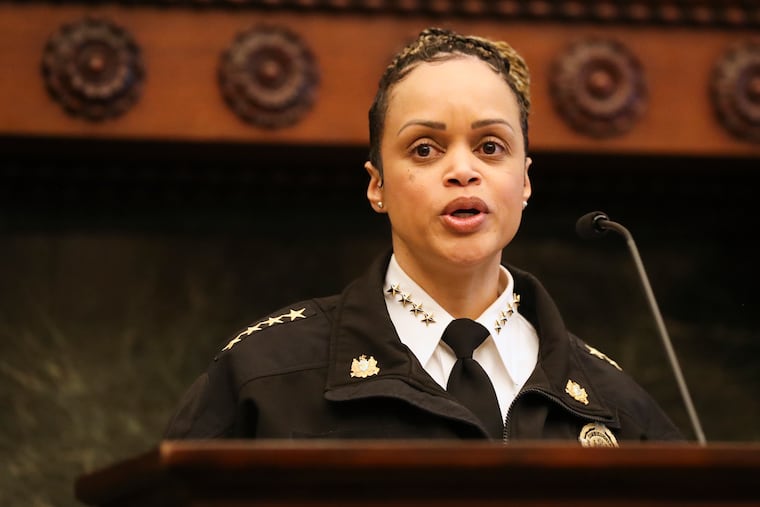Lacking accountability, some Philly cops follow checkered path to high-ranking positions | Editorial
Apparently, one way to get ahead in the Philadelphia Police Department is to first get fired. No wonder some officers act as if they are above the law.

As Philadelphia endures record numbers of shootings and murders, Police Commissioner Danielle Outlaw implemented a second department shake-up in less than a year, which included promoting several dozen officers and transferring others.
Whether her actions result in safer streets remains to be seen. Given some of the officers who were commended, let’s hold the applause for now.
One of the promoted officers was fired in 2020 after allegedly supervising a meeting where officers were instructed to falsify reports in drug cases. He was also accused of attacking a female officer, hurling racist insults, and hiding information from the District Attorney’s Office. Last year, an arbitrator found the officer’s dismissal violated policy and reinstated him with back pay.
A second officer who was promoted had been dismissed in 2013 after he was charged with aggravated assault and stalking his girlfriend. The charges were dropped after a witness failed to appear in court, and the officer was reinstated.
A third officer who was promoted had been suspended for three days in 2011 after he lost his gun. Three years later, he was suspended for six days after improperly releasing three shooting suspects without questioning them, confiscating their weapons, or entering their information into police records.
» READ MORE: A damning audit of the Philadelphia police must be an impetus for real reform | Editorial
Missing among the pomp and promotions was a police captain who resigned while he was under investigation for abuse of city grant funds. He, too, had been in line for a promotion but was reassigned after an Inquirer report last year detailed chronic absenteeism and chaos in the precinct he oversaw.
A separate Inquirer investigation last month detailed how the captain and several of his officers had improperly received over $75,000 from a city grant for a youth boxing program.
The captain had previously been fired for allegedly stealing money from a man during a traffic stop, but got his job back in 2005.
The message to many who are already wary of the police — as well as to many young officers learning the ropes — is that apparently, one way to get ahead in the Philadelphia Police Department is to first get fired. For that, you can thank the Fraternal Order of Police, which protects all cops, even the rotten apples.
Indeed, when it comes to being a Philly cop, fired rarely means fired. About 70% of officers disciplined in incidents from 2011 to 2019 had their cases overturned or reduced, The Inquirer found.
No wonder some officers act as if they are above the law.
That may help explain the parade of people who have been wrongly convicted, often as a result of shoddy police work.
India Spellman was released from prison last week for the murder of an 87-year-old man in 2010. Spellman, who was 17 at the time of the murder, spent nearly a decade behind bars before a judge found her trial was unconstitutional.
Spellman said her confession was coerced by homicide detective James Pitts. A key witness, who was 14 at the time, later testified that his statement was also coerced by Pitts. The case included other sloppy work by prosecutors and police, including the destruction of evidence.
» READ MORE: A win for the police union should not be a loss for Philadelphia | Editorial
As for Pitts, his police work makes it hard to tell the cops from the criminals. Dozens have accused him of coercion and beatings. At least nine murder cases he worked on have been overturned or dismissed.
So far, Pitts has cost city taxpayers $3 million to settle seven lawsuits that accused him of civil rights violations. He was still on the force in 2021 when The Inquirer detailed many of the allegations against him dating back more than a decade.
Pitts, who is no longer on the force, was charged with perjury last year. At the time, FOP president John McNesby said the union would represent Pitts and “provide an appropriate defense against these allegations.”
Promoting cops who have been fired and defending the indefensible undermines public trust and support for the many police officers who risk their lives and uphold the law. It hurts morale among good cops when they see that even a slap on the wrist comes with a pat on the back.
The steady stream of rogue officers raises deeper questions about the hiring, training, and culture of a police department that costs taxpayers nearly $800 million a year. It also begs a bigger question: Is anyone policing the police?